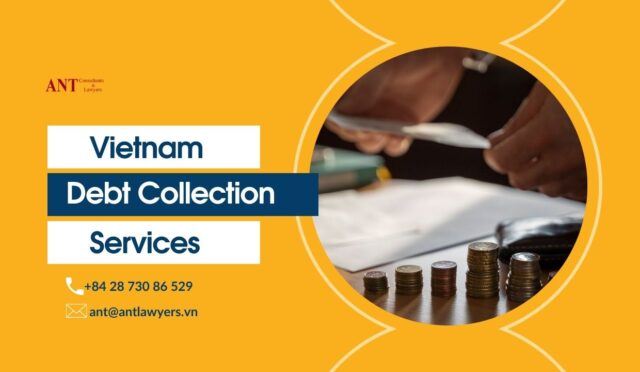Navigating debt collection in Vietnam presents unique challenges due to the country’s legal framework that prohibits the registration and operation of debt collection services as a business line. Despite this, businesses must still find ways to recover outstanding debts to maintain cash flow and financial health. The following explores how companies can effectively manage Vietnam debt collection services through strategic planning, legal assistance, and proactive measures.

Understanding the Legal Landscape
Prohibition of Vietnam Debt Collection Services
Vietnamese law explicitly prohibits companies from operating dedicated debt collection services. This regulation is intended to prevent abusive practices and protect debtors. The Law on Investment outline these restrictions, emphasizing the importance of fair and lawful debt recovery practices.
Legal Implications of Vietnam Debt Collection Services
Businesses must navigate these legal restrictions carefully to avoid penalties. Understanding the implications of these laws and how they affect debt recovery processes is crucial for compliance and effective debt management.
Role of the Government Monitoring Vietnam Debt Collection Services
The Vietnamese government plays a significant role in regulating and overseeing Vietnam debt collection services practices to protect debtors’ rights and ensure fair treatment. Regulatory bodies are vigilant in monitoring businesses to ensure they do not engage in prohibited debt collection activities. This oversight extends to both domestic and foreign businesses operating in Vietnam.
The Role of Law Firms in Vietnam Debt Collection Services
Legal Advisory Services for Vietnam Debt Collection Services
Law firms play a critical role in assisting businesses with Vietnam debt collection services. They provide essential legal advice on navigating the regulatory landscape, ensuring compliance with local laws, and identifying lawful methods for debt recovery.
Legal advisors can guide businesses on structuring transactions to minimize the risk of default and outline the legal recourse available in case of non-payment. Their expertise in Vietnamese law helps businesses develop strategies that comply with the regulations while effectively managing debt recovery efforts.
Contract Drafting and Review
A well-drafted contract is the first line of defense against unpaid debts. Law firms help businesses create contracts with clear payment terms, default clauses, and dispute resolution mechanisms. These provisions minimize the risk of non-payment and provide a legal basis for pursuing debts.
Contracts should clearly state payment deadlines, acceptable payment methods, and penalties for late payments. Including detailed terms and conditions helps prevent misunderstandings and provides a solid foundation for legal action if necessary. For most of the time, the biggest mistake it that many international contract template might not fit with Vietnam environment while the debt amount is not significant enough to pursue litigation or arbitration under foreign courts or foreign arbitration centers with international laws while enforcement mechanism in Vietnam is not taken into consideration.
Negotiation and Mediation under Vietnam Debt Collection Services
Law firms can act as intermediaries to negotiate and mediate disputes between creditors and debtors. This approach often leads to amicable settlements, preserving business relationships and avoiding the need for litigation.
Mediation and negotiation require skilled professionals who can facilitate discussions between the parties, helping them reach a mutually acceptable resolution. This process not only saves time and money but also maintains positive business relationships.
Legal Proceedings for Vietnam Debt Collection Services
When negotiations fail, law firms can represent businesses in legal proceedings to recover debts. This includes filing lawsuits, representing clients in court, and enforcing judgments, all within the boundaries of Vietnamese law.
Litigation is a last resort due to its time-consuming and costly nature. However, law firms provide the necessary expertise to navigate the legal system, ensuring that businesses can pursue their claims effectively.
If the contract allows, arbitration would also be used which might provide a faster solution.
Compliance and Risk Management
Law firms assist businesses in implementing compliance programs to ensure adherence to Vietnamese laws and regulations. This proactive approach reduces the risk of legal disputes and enhances overall risk management.
Compliance programs involve regular reviews of business practices, employee training, and updating internal policies to reflect current laws. By staying compliant, businesses can avoid legal pitfalls and enhance their reputation in the market.
Strategies for Effective Vietnam Debt Collection Services
Preemptive Measures of Vietnam Debt Collection Services
1. Creditworthiness Assessment
Conduct thorough credit checks on potential clients to assess their ability to pay before entering into transactions. This step is crucial in mitigating the risk of future payment issues. Understanding a client’s financial health helps businesses make informed decisions about extending credit.
Creditworthiness assessments can include reviewing financial statements, credit reports, and references from other businesses. This comprehensive evaluation helps identify potential risks early, allowing businesses to take precautionary measures.
2. Clear Contract Terms
Draft contracts with explicit payment terms, including due dates, penalties for late payments, and dispute resolution procedures. Clear terms set expectations and provide a legal basis for debt recovery.
Contracts should be specific about payment schedules, acceptable payment methods, and consequences for late or missed payments. By clearly defining these terms, businesses can reduce the likelihood of disputes and ensure that both parties understand their obligations.
3. Regular Monitoring
Continuously monitor the financial health of clients and follow up on overdue payments promptly. Early detection of potential payment issues allows for timely intervention.
Regular monitoring involves tracking payment histories, reviewing financial reports, and maintaining open communication with clients. By staying informed about a client’s financial situation, businesses can identify warning signs and take action before issues escalate.
Debt Recovery through Legal Channels
4. Demand Letters under Vietnam Debt Collection Services
Law firms can draft and send formal demand letters to debtors, outlining the outstanding amounts and the consequences of non-payment. These letters often prompt debtors to settle debts to avoid legal action.
A well-crafted demand letter includes details of the outstanding debt, the deadline for payment, and potential legal consequences if the debt remains unpaid. This formal communication demonstrates the seriousness of the situation and encourages debtors to resolve the matter quickly.
5. Settlement Agreements to Implement Vietnam Debt Collection Services
Negotiate and draft settlement agreements that outline the terms of debt repayment in a manner acceptable to both parties. Settlement agreements can provide a structured repayment plan and reduce the likelihood of disputes.
Settlement agreements should detail the repayment schedule, amounts, and any interest or penalties applicable. By reaching a mutual agreement, businesses and debtors can avoid litigation and find a solution that works for both parties.
6. Litigation or Arbitration for Vietnam Debt Collection Services
Initiate legal action against debtors who fail to settle their debts. Law firms guide businesses through the litigation process, ensuring all legal procedures are followed to obtain a favorable judgment.
Litigation involves filing a lawsuit, presenting evidence in court, and seeking a judgment to recover the owed amounts. Law firms provide the expertise needed to navigate the legal system and increase the chances of a successful outcome.
Arbitration could also be used if the arbitration clause is used in the contract.
Effective Debt Management Practices
Comprehensive Risk Analysis
7. Risk Assessment
Perform a thorough risk assessment before entering into transactions. Understanding the financial stability and payment history of potential clients helps in making informed decisions and reducing the risk of non-payment.
Risk assessments involve analyzing a client’s financial statements, credit history, and industry conditions. By identifying potential risks early, businesses can implement strategies to mitigate these risks, such as requiring upfront payments or securing collateral.
8. Due Diligence
Conduct due diligence to verify the legal standing and financial health of clients. This process includes reviewing financial statements, credit reports, and any available legal records.
Due diligence helps businesses understand the full scope of a client’s financial situation and potential liabilities. This comprehensive review ensures that businesses make informed decisions and avoid entering into risky agreements.
Continuous Monitoring and Follow-Up
9. Ongoing Monitoring
Implement systems for ongoing monitoring of client accounts. Regularly review payment histories and financial health to identify potential issues early.
Ongoing monitoring involves setting up alerts for overdue payments, conducting regular financial reviews, and maintaining communication with clients. By staying proactive, businesses can address issues before they escalate into major problems.
10. Proactive Follow-Up
Establish a proactive follow-up process for overdue payments. Timely reminders and follow-up actions can prompt clients to settle their debts more quickly.
Proactive follow-up includes sending reminder emails, making phone calls, and scheduling meetings to discuss payment issues. By maintaining regular contact, businesses can keep payment issues top of mind for clients and encourage timely resolution.
Legal Framework and Business Compliance
Understanding Vietnamese Laws
Understanding and complying with Vietnamese laws is crucial for businesses involved in debt collection. Law firms provide valuable insights into the legal framework, helping businesses navigate regulations and avoid legal pitfalls.
Vietnam’s legal system includes various laws and decrees that govern business practices, including debt collection. Staying informed about these regulations ensures that businesses operate within legal boundaries and protect their interests.
Implementing Compliance Programs
Law firms assist businesses in developing and implementing compliance programs that align with Vietnamese laws. These programs involve regular audits, employee training, and updating internal policies to reflect current regulations.
Compliance programs help businesses avoid legal issues and enhance their reputation. By demonstrating a commitment to ethical practices, businesses can build trust with clients and stakeholders.
Legal Recourse and Enforcement
Understanding the legal recourse available in case of non-payment is essential for effective debt management. Law firms guide businesses through the process of enforcing judgments and recovering debts through legal channels.
Legal recourse may include obtaining court orders, garnishing wages, or seizing assets. Law firms provide the expertise needed to navigate these processes and ensure that businesses can recover owed amounts efficiently.
Conclusion: Navigating Vietnam Debt Collection Services
Navigating debt collection in Vietnam requires a strategic approach that adheres to legal restrictions while effectively recovering outstanding debts. Law firms play a vital role in this process, offering legal advice, drafting robust contracts, negotiating settlements, and representing clients in legal proceedings.
By implementing preemptive measures, conducting comprehensive risk analysis, and leveraging the expertise of law firms, businesses can enhance their debt collection efforts and maintain financial stability. Understanding the regulatory landscape and adopting effective debt management practices is essential for success in the challenging environment of Vietnam debt collection services.
While the prohibition of dedicated debt collection services in Vietnam presents challenges, businesses can effectively manage debt recovery and ensure compliance with Vietnamese laws but also enhances the efficiency and success of debt collection efforts.
About ANT Lawyers, a law firm in Vietnam
We help clients overcome cultural barriers and achieve their strategic and financial outcomes, while ensuring the best interest rate protection, risk mitigation and regulatory compliance. ANT lawyers has lawyers in Ho Chi Minh city, Hanoi, and Danang, and will help customers in doing business in Vietnam.




Không có nhận xét nào:
Đăng nhận xét